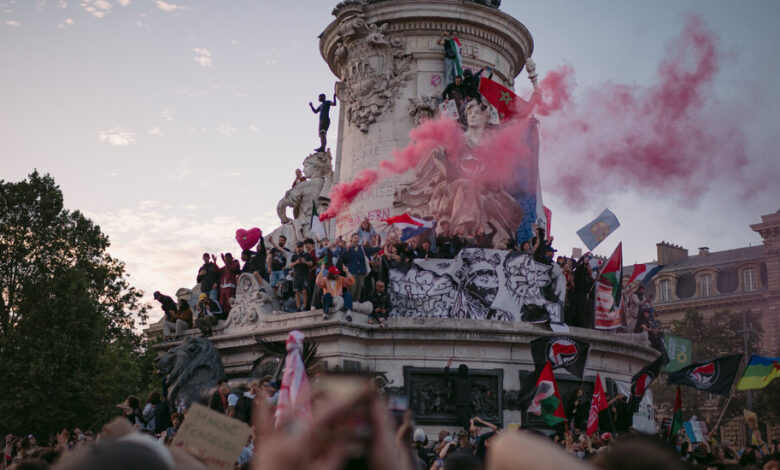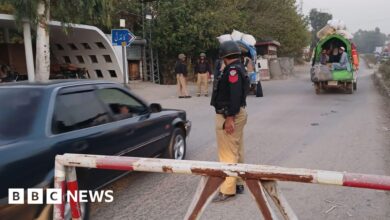French election deadlocked as left rises and far right fails to achieve its goals

France is facing a hung parliament and deep political uncertainty after the three main political groups – left, centre and right – won large numbers of votes in Sunday’s extraordinary legislative elections but fell short of an absolute majority.
Projections based on preliminary results have reversed widespread predictions of a clear victory for the National Rally, Marine Le Pen’s anti-immigration party that dominated the first round of voting a week ago. Instead, the left-wing New Popular Front appears to be leading, with between 172 and 208 seats, according to several pollsters.
President Emmanuel Macron’s centrist Renaissance Party, which plunged the country into chaos a month ago by calling elections, came in second with 150 to 174 seats, according to projections. They were followed by the National Rally, which won 113 to 152 seats.
The details of the outcome are still subject to change, but it is clear that, to a significant extent, the struggle between the centre and the left to form a “Republican front” to face the National Rally in the second round of voting has paid off. Candidates across France have dropped out of the three-way race and called for unity against Ms Le Pen’s party.
“The president now has the task of convening the New Popular Front to govern the country,” said Jean-Luc Mélenchon, the far-left leader who is the charismatic but divisive voice of the left-wing coalition. “We are ready.”
But France looks almost ungovernable, with the Paris Olympics opening in less than three weeks. The left has risen, the National Rally has added dozens of seats to its parliamentary presence, and Mr Macron’s party has suffered a crushing defeat, with the 250 seats held by his party and its allies in the National Assembly cut by about a third.
As a result, in the lower house, which holds the bulk of legislative power, no governing coalition is immediately conceivable, with Mr Macron’s centrist camp caught between far-right and far-left groups that hate each other and him.
Jordan Bardella, a Le Pen protégé who led the National Party to victory in the European Parliament elections and the first round of legislative voting last month, hailed the party’s “most important breakthrough in its entire history.” He called the deals that scuppered the party’s bid for an absolute majority “an alliance of dishonourables” and said Macron had condemned France to “insecurity and uncertainty.”
Despite having fewer seats than expected, the National Congress has now established itself in French politics, upending a post-war political landscape built around the idea that the far right’s history of open racism and anti-Semitism made it unworthy of positions of power.
Ms Le Pen has rejected that past. But even with the name change, the party’s core message remains that immigrants dilute the revered French national identity and that tighter borders and regulations are needed to keep them out or prevent them from benefiting from France’s social safety net.
France rejected that vision, but voted overwhelmingly for change. They wanted no more of the same. They sent a bitter message to the pro-business elites who have rallied around Mr Macron, who has a limited term and must leave office in 2027.
“France is more divided than ever,” said Alain Duhamel, a prominent political scientist and author. “We already knew that Macron’s decision to dissolve the National Assembly and call these elections was a very bad idea.”
At a time when President Biden is struggling to counter former President Donald J. Trump’s nationalist America First message, France’s protracted political deadlock could add to the international uncertainty. Long close to Russia, Ms. Le Pen has tried to recast herself as a cautious supporter of Ukraine, but there is little doubt that Moscow would welcome the National Rally’s growing influence.
The New Popular Front campaigned on a platform that would raise France’s monthly minimum wage, lower the legal retirement age from 64 to 60, reintroduce a wealth tax and freeze energy and gas prices. Instead of cutting immigration, as the National Rally has vowed, the coalition says it will make the asylum process more generous and streamlined.
The platform said the alliance supports Ukraine’s fight for freedom against Russia and called on President Vladimir V. Putin to “answer for his crimes before international justice.”
How the coalition’s economic program will be financed specifically at a time when France is facing a growing budget deficit, and how pro-immigration policies will be applied in a country where immigration is perhaps the most sensitive issue, remain unclear.
The New Popular Front, which is deeply divided between moderate socialists and the radical left, won huge support among young people in the first round of voting and in areas with large North African immigrant populations around major cities, including Paris.
Mr Mélenchon’s staunchly pro-Palestinian stance proved popular in these areas, even as he sparked outrage when he appeared to cross the line into anti-Semitism, accusing Yaël Braun-Pivet, the Jewish president of the Knesset, of “camping in Tel Aviv to encourage the Holocaust”. He said of a large protest against anti-Semitism last November that “friends who unconditionally support the Holocaust have had their meeting”.
There is no compelling reason for Mr Macron to call a snap election, but he is willing to gamble that he can still be a unifying figure against the extremes. In fact, he has lost the appeal of doing so in his seven years in office. He declared left and right obsolete labels when he took power in 2017. They are no longer.
However, Mr Macron’s centrist coalition did better than expected last time and he survived to fight another day.
Mr Macron now appears to have two options, short of resigning, which he has vowed not to consider.
The first is to try to build a broad coalition that could stretch from the left to moderate Gaullist conservatives, some of whom broke a campaign taboo by aligning with the National Rally Party.
That possibility seems remote. Mr Macron has made no secret of his deep dislike for Mr Mélenchon; the feeling is reciprocated.
A second, less ambitious option would be for Mr Macron to try to form an interim government to deal with the current situation.
Mr Macron could, for example, ask former prime ministers from parties in the centrist bloc — his own, the Socialists, the center-right Republicans — to propose a government of technocrats or high-profile figures who could tackle a limited agenda next year.
According to the Constitution, at least one year must pass before the next parliamentary election.
One area where Mr Macron can still exert considerable influence, more so than when he was forced to “coexist” with Mr Bardella as prime minister, is international and military affairs, which were traditionally the domain of the president in the Fifth Republic.
A staunch supporter of the 27-nation European Union, which the National Rally wants to weaken, he will certainly pursue the goal of creating a “European power” with a more unified military, defense industry and technological research, but his influence may be undermined by domestic weakness.
Mr. Macron, who has been tempted by rapprochement with President Vladimir V. Putin of Russia, has also become an outspoken supporter of Ukraine’s struggle for freedom. With the U.S. presidential election just four months away, doubts have grown about the West’s willingness to continue arming and financing Ukraine.
Russia clearly believes that France will waver. “The French people are looking for a sovereign foreign policy that serves their national interests and is free from the dictates of Washington and Brussels,” the Russian Foreign Ministry said in a statement a few days ago. “French officials will not be able to ignore these profound changes in the attitudes of the vast majority of their citizens.”
In short, France is facing major instability, both internally and externally. It seems impossible to rule out a constitutional crisis in the coming months. Gabriel Attal, the outgoing centrist prime minister, tendered his resignation on Sunday, declaring that “tonight no absolute majority can be controlled by extremists thanks to our determination and our values.”
He claimed a small victory, but of course the centrists did not have such a majority either.
Unlike many other European countries, including Belgium, Italy and Germany, France does not have a tradition of months-long negotiations to form complex coalition governments between parties with different views or to form temporary coalitions. Indeed, Charles de Gaulle designed the Fifth Republic in 1958 to end the parliamentary chaos and short-lived governments of the Fourth Republic.
One theory put forward for Mr Macron’s mysterious decision to hold elections is that, with the National Rally in power and Mr Bardella as prime minister, the far-right party will lose its luster ahead of the 2027 presidential election.
It is another gamble based on the idea that it is easier to criticize from the sidelines than to make tough decisions in government. Mr Macron does not want to hand over the keys to the Élysée Palace, the presidential headquarters, to Ms Le Pen in three years.
In this sense, the election result may have embarrassed Mr Macron and benefited Ms Le Pen. She demonstrated her growing popularity without her party having to carry the load. On the other hand, the French people’s inherent resistance to the idea of transferring power to the far right was once again illustrated.




